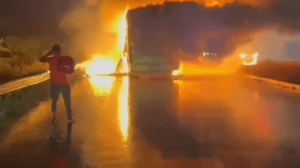Vatican next door, we opened window for fresh air on conversion
The Sunday Express columnist reports from Rome, where he was invited to attend a rare inter-faith meeting on religious freedom—and responsibility

Religious conversions are a problem in most countries in the world. But can religions of the world also cooperatively evolve a solution, even a partial solution, to this vexed problem? At a time of much suspicion about each other’s faiths, this does seem a tall order. However, a ray of hope emerged at an inter-faith meeting, attended by this writer, in Italy earlier this week, which called for collective formulation of a “code of conduct on conversions that all faiths should follow.”
As a specific aspect of the “code of conduct”, the meeting recommended that conversions effected by “unethical” means should be “discouraged and rejected by one and all”. It also held that “there should be transparency in the practice of inviting others to one’s faith.”
The participants said, “While deeply appreciating humanitarian work by faith communities, we feel that it should be conducted without any ulterior motives. No faith organization should take advantage of vulnerable sections of society, such as children and the disabled.”
What made the five-day meeting (May 12-16) especially significant was that it was organised by the Pope’s Council for Interreligious Dialogue, Vatican City, and the Office on Interreligious Relations & Dialogue of the World Council of Churches, Geneva. Christian missionaries belonging to different churches are often the targets of accusation for carrying out large-scale conversions in Asia and Africa, including in India. Christian groups in turn allege that they are persecuted by intolerant anti-Christian organisations.
Therefore, the fact that two of the most important and widely regarded Christian religious establishments jointly took the initiative to invite representatives of various faiths several countries around the globe made the meeting meaningful on two grounds.
Firstly, it made the rarely discussed issue of religious conversions, which are often a cause of misunderstanding and tension among communities in many parts of the world, a part of the inter-faith dialogue process. Secondly, it demonstrated that both the Vatican and the WCC, which is a voluntary association of non-Catholic communities, are now willing to listen to the concerns of non-Christian communities, just as they would like Christian concerns to be heeded by others.
The meeting took place at Villa Mater Dei, an idyllic spiritual sanctuary in Lariano near Rome, and was attended by a somewhat eclectic group of monks, preachers and intellectuals belonging to Buddhism, Christianity, Hinduism, Islam, Judaism and Yoruba, a traditional faith in Africa.
The meeting’s usefulness was borne out by the significant recommendations in the final agreed report produced by the participants. “Freedom of religion,” the report said, “is a fundamental, inviolable and non-negotiable right of every human being in every country in the world. Freedom of religion connotes the freedom, without any obstruction, to practise one’s own faith, freedom to propagate the teachings of one’s faith to people of one’s own and other faiths, and also the freedom to embrace another faith out of one’s own free choice.”
Seeking to strike a balance between freedom and responsibilities in religious matters, the report noted, “Freedom of religion enjoins upon all of us the equally non-negotiable responsibility to respect faiths other than our own, and never to denigrate, vilify or misrepresent them for the purpose of affirming superiority of our faith. While everyone has a right to invite others to an understanding of their faith, it should not be exercised by violating other’s rights and religious sensibilities. At the same time, all should heal themselves from the obsession of converting others.”
On a subject like conversions, it was only to be expected that candid arguments would bring up critical remarks about the theology and practice of each other’s communities. Nevertheless, almost all participants, while freely pointing out what they considered was problematic in other faiths, were also willing to be self-critical about their own faiths. This yielded another important recommendation. “We acknowledge that errors have been perpetrated and injustice committed by the adherents of every faith. Therefore, it is incumbent on every community to conduct honest self-critical examination of its historical conduct as well as its doctrinal/theological precepts. Such self-criticism and repentance should lead to necessary reforms inter alia on the issue of conversion.”
The dialogue helped in developing “a convergent understanding of the several aspects of the issue of religious conversion, making us more sensitive to each other’s concerns, and thus strengthening our understanding that such concerns need to be addressed through appropriate action locally, nationally and internationally.” The convergence could happen because all the participants believed that religion should be “a source of uniting and ennobling of humans.” And were willing to learn from one another’s spiritual heritage, which, according to them, “together constitute the common inheritance of the entire humankind”.
Team up to fight Islam: VHP to Pope
• The VHP has offered to team up with the Pope to fight their ‘‘common adversary’’ — Islamic terrorism..
• India wasn’t troubled by the Pope’s remarks that there were ‘‘disturbing signs of religious intolerance’’ in some parts of the country, said Amitava Tripathi, India’s new ambassador to the Vatican.
–sudheendra.kulkarni@expressindia.com



- 01
- 02
- 03
- 04
- 05




























